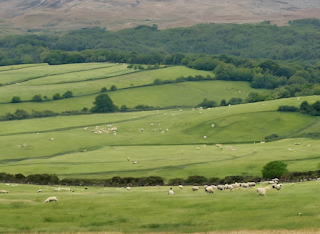Search Blog
Hit enter to search or ESC to close
Trending Now
Parshas Shemos/Vaera - The Birth of a New Religion and the Age of Miracles
- Get link
- X
- Other Apps
Showing posts from 2020
Posts
Parsha Miketz - Don't Follow Your Dreams
Parshas Miketz begins with a dream. Previously, Vayetze had begun with a dream and Vayeshev had begun and ended with dreams. But there's a substantive difference between the earlier dreams, those of Yaakov, and the later dreams involving Yosef. In Yaakov's dreams, G-d or an angel had explained their meaning or purpose to the patriarch, whereas Yosef' had to explain his own dreams and those of others. As the embryonic Jewish people moved closer to the point of exile, the connection with G-d appeared to grow tenuous. Until Moshe, Yaakov would be the last Jew whom the Torah describes G-d speaking to. In the Egyptian exile, the Jews were no longer able to hear G-d. Yosef's dreams, filled with abstract symbols, but without words, were the beginning of that exile in more ways than one. The dreams would help bring on a physical exile, but they were also the symbols of a spiritual exile from the close connection of direct conversations and clear messages that Avraham, Yitzchak,...
- Get link
- X
- Other Apps
The Chanukah of Chanukah - Why We Only Celebrate the Dedication of a Defiled Temple
What is Chanukah specifically? Many discussions about Chanukah begin with the artificial distinction between the military victory and the miracle of the oil that burned for 8 days. This distinction is wholly artificial because the war had been fought by a priestly family over the desecration of the sacred service and concluded with the purification of the Temple. The military campaign and the reclamation of the Temple are the means and the end. The miracle of the oil was the achievement of the goal for which the battle had been fought. To separate the two as if they belonged to two different world is like separating the blowing of the shofar at the Western Wall from the Six Day War. Both were miracles, but one was the moral climax of the miracle. The miracle of the menorah was, in the old military slogan, "why we fight". And yet Chanukah, the name of the holiday, references neither the battle nor, explicitly, the menorah. Chanukah simply means dedication. The first dedication...
- Get link
- X
- Other Apps
Parshas Chayei Sarah - The Two Tests of Rivka
After the death of Sarah, much of her namesake parsha is concerned with finding a successor matriarch. The journey of Eliezer, Avraham's servant, to find a wife for Yitzchak (Isaac) is chronicled in detail, and at its center is Eliezer asking G-d for a sign. The sign is that the woman who would be right for Yitzchak and for the next generation of the dynasty begun by Avraham is one who would show kindness by bringing water to a stranger and his camels. And he finds that woman in the form of Rivka or Rebecca. Kindness and hospitality were certainly key characteristics for Avraham, yet his ultimate crisis and test was having to sacrifice his own son. Rivka's own climactic test was a similar one. After years of being unable to have children, she suddenly had twins, only to be told that one of them was evil. Like Avraham, his daughter-in-law would have to sacrifice a child. And while Eliezer might not know what was to come, G-d certainly did. How would a test o...
- Get link
- X
- Other Apps
Parshas Noach - The Duality of the Second Father of Mankind
Noach, as a figure, comes burdened with ambiguity from the very beginning. Instead of taking the Torah's declaration of his righteousness at face value, they dig into the qualifier of the verse. "Noach ish tzaddik tamim haya bedorotav", "Noach was a perfectly righteous man in his time" becomes the basis of an argument over whether he was really a righteous man, or only righteous by the standards of his age. Would he have been a better or a worse man in a nobler time, they inquire. If this seems unfair, Noach is the second father of mankind, and the man who plants a vineyard and gets drunk in front of his sons and grandson. He's a righteous man, but unlike Avraham, seems to have little impact on those around him. And even his grandson turns out to be wicked and ends up cursed by him. The duality and ambiguity of Noach is there at the beginning. His name, Noach, means rest. His father gave him the name hoping that with his birth, mankind would have rest from t...
- Get link
- X
- Other Apps
Parshas Vaeschan - The Unanswered Prayer and the Unexpected Legacy
Prayers rarely go unanswered by G-d. The five books of the Torah contain two examples of impassioned prayers that G-d does not grant. The first comes early on when Avraham prays on behalf of Sodom and the second comes near the end when Moshe prays to G-d to be allowed to enter Israel, and is told by that it will not happen. Both of the prayers of these two great men were not trivial personal requests, rather urgent cries from the heart for what they considered to be their fundamental mission in life. Avraham thought that his mission was reaching the world with the message of G-d, and Moshe thought that his mission was bringing the Jewish people into Israel. Both prayers were not granted because these were not their true missions. Avraham's true mission, despite his greatest efforts, was not to reach the world, but to bring a nation into the world. He could not save Sodom, but he could teach his son, Yitzchak, to follow in his footsteps. Moshe's mission was not to bring the Jew...
- Get link
- X
- Other Apps
Parsha Maasos - The Rebellion of the Rancher Lords
As the conquest of Israel is underway, the leaders of Reuven and Gad approach Moshe and ask him to grant them the lands already conquered for grazing (Bamidbar 32), Moshe, with uncharacteristic fury, accuses them of following in the footsteps of the original ten tribal spies who had discouraged the Jews from entering the land. "And, behold, ye are risen up in your fathers' stead, a brood of sinful men," Moshe blasted them. What's behind Moshe's anger and what's the connection to the sin of the spies? Is it merely a casual connection or is there something deeper there? The motives of Reuven and Gad are obvious, but those of the spies remain unclear. Why were influential and prominent men so driven to discourage the settlement of Israel? Rebellions by the Jews in the desert largely fell into two categories. There were mass rebellions over shortages of food and water, or general panic, and attempted coups by the powerful against Moshe. The revolts o...
- Get link
- X
- Other Apps









